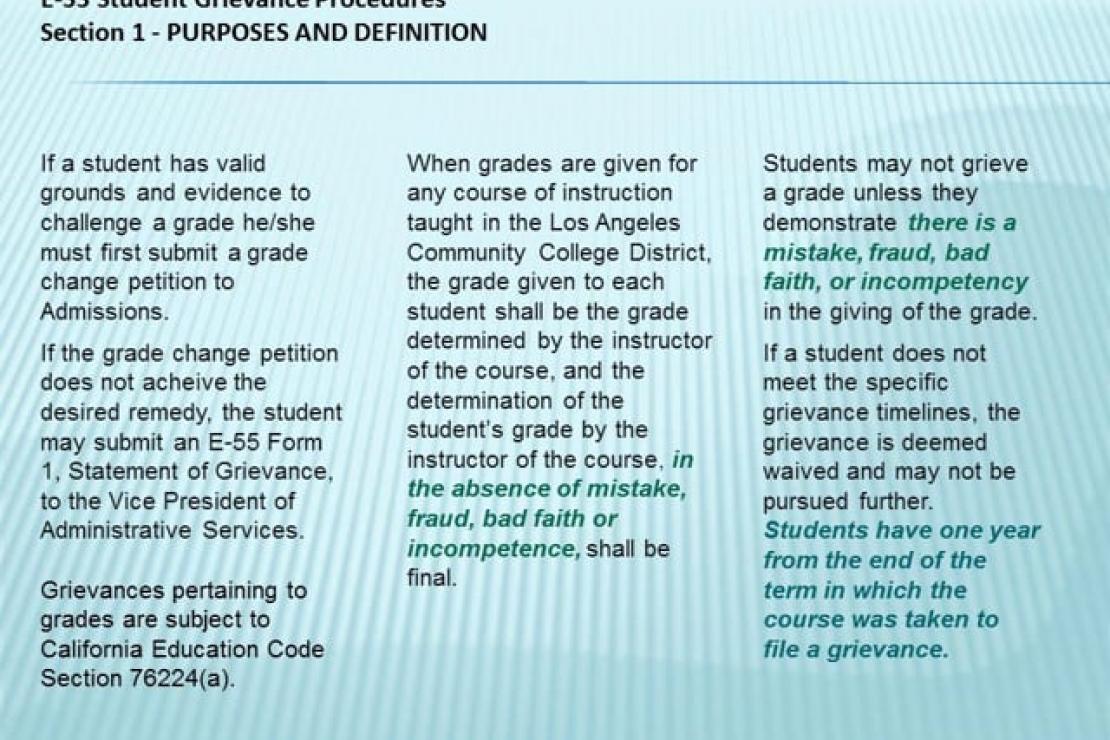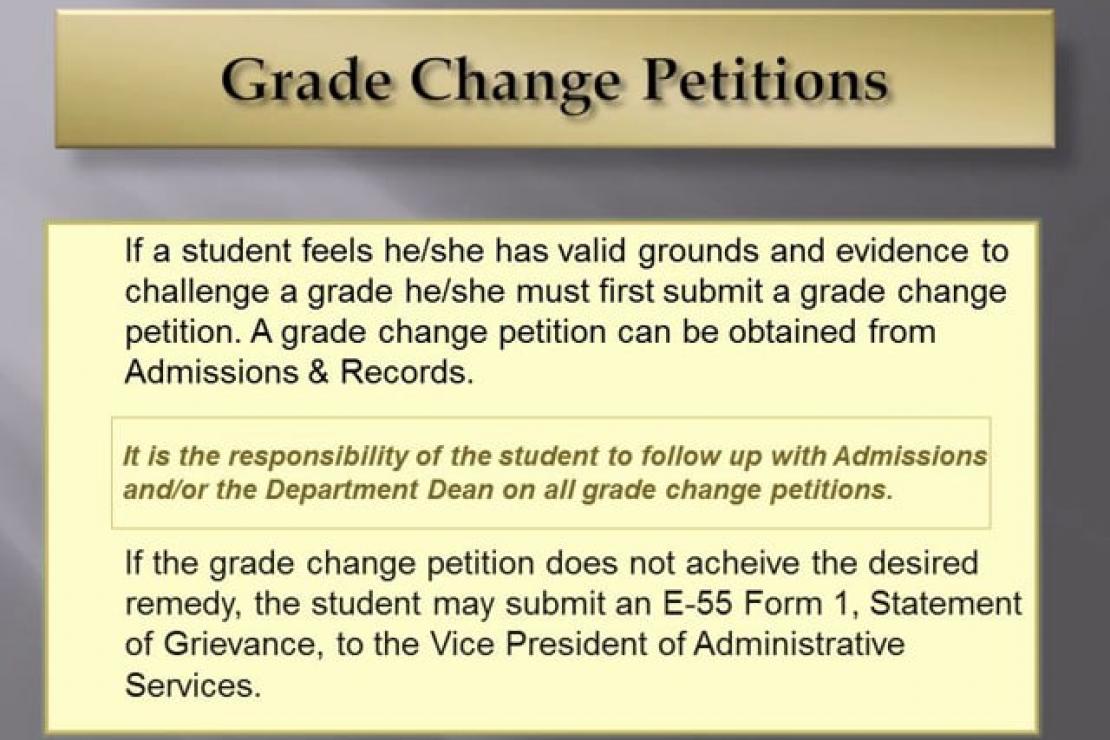Final Grade Grievance Procedures
Student Grievance Procedures
The purpose of the E-55 Administrative Regulation - AP 5530- Form 1: Statement of Grievance - is to provide a prompt and equitable means for resolving student(s) grievances.
"The statute of limitations period for requesting a Grievance Hearing under this regulation is 120 calendar days after the occurrence of the incident giving rise to the grievance; or 120 calendar days after the student learns, or should have learned, that the student has a basis for filing a grievance. Pursuing an informal remedy for a grievance does not relieve the Grievant of the responsibility of requesting a Grievance Hearing within 120 calendar days of the incident giving rise to the grievance."
The burden of proving mistake, fraud, bad faith and/or incompetence is on the student. Basically, this means that you, the student, must provide the evidence to prove "mistake, fraud, bad faith or incompetence" against the instructor you are grieving.
That's depends on what you are attempting to prove. In most matters, you will need to supply the Grievance Officer or Ombudsman with the course syllabus, any email communications you may have had with the instructor surrounding the matter, and any returned student work.
Per AP5530:
INFORMAL RESOLUTION
All parties involved should be encouraged to seek an informal remedy. Informal meetings and discussion between persons directly involved in a grievance are essential at the outset of the dispute and should be encouraged at all stages. An equitable solution should be sought before persons directly involved in the case have assumed official or public positions that might tend to polarize the dispute and render a solution more difficult.
a. In an effort to resolve the matter in an informal manner, the student(s) may, if appropriate, schedule a meeting with the person with whom the student(s) has the grievance, and if necessary, schedule a meeting with the person's immediate supervisor and/or schedule a meeting with the appropriate college administrator.
b. If the matter is not resolved at step “a,” the student will contact the College Ombudsperson for assistance. The student shall provide the Ombudsperson with a written Statement of Grievance and may provide any other information and documentation in support of the grievance. The Statement of Grievance shall specify the time, place, nature of complaint, and the remedy or corrective action requested. If a student believes that a specific District policy has been violated, the student should specify the policy or policies alleged to have been violated. The Ombudsperson shall inform the student of the student’s rights and responsibilities under this regulation.
c. The Ombudsperson will provide a copy of the Statement of Grievance to the Respondent within ten (10) instructional days of receipt of the grievance, or as soon thereafter as practicable.
d. The Ombudsperson shall gather, copy and review pertinent information, records and documentation and communicate with all parties, and attempt to mediate an informal resolution.
FORMAL RESOLUTION PROCEDURES
a. Thirty (30) instructional days after the student has requested assistance from the Ombudsperson (and provided a written Statement of Grievance), but not later than one-hundred twenty calendar days after the incident, if there is no informal resolution of the grievance, the student has a right to request a Grievance Hearing. The student may also request, through the Ombudsperson, that any relevant information and documentation be made available at a hearing. The information requested will be provided in such a way that it does not violate the privacy rights of others. The Grievance Hearing Request must be made within one hundred and twenty (120) calendar days of the date of the alleged incident that is the basis of the student's complaint.
b. The Grievant may request from the Ombudsperson the assistance of a Student Advocate, if the Grievant so chooses (see Section 10); or the Grievant may obtain the assistance of a person of his or her choice, except the Grievant may not be represented by legal counsel.
c. The Respondent may represent himself or herself; or the Respondent may obtain the assistance of a person of his or her choice, except the Respondent may not be represented by legal counsel.
d. Within ten (10) instructional days following receipt of the Request for a Grievance Hearing, or as soon thereafter as practicable, a Grievance Hearing Committee (see Section 6) shall meet to select a chairperson and decide if a Grievance Hearing will be held. The Committee shall consider whether the Grievant has met the following requirements:
1. The request contains allegations, which, if true, would constitute a grievance under Section 1 of these procedures;
2. The Grievant(s) has standing to assert the claim by being a student;
3. The Grievant has met the requirements of the grievance procedure with respect to timeliness and standing to file; and the alleged act is subject to the grievance procedure;
4. The Grievant (s) is personally and directly affected by the alleged grievance;
5. The remedy requested by the Grievant is appropriate for the act that is alleged and is not frivolous; and
6. The Grievant has cooperated in the processing of the grievance.
e. If the above conditions are satisfied, the Grievance Hearing Committee Chairperson shall notify the Ombudsperson in writing, within five (5) instructional days, or as soon thereafter as practicable, that a Grievance Hearing will be held. At this time, the Grievance Hearing Committee may request the production of documents, records and information requested by the Grievant and by the Respondent.
Within ten (10) instructional days of the Grievance Hearing Committee’s decision on whether to hold a hearing, the Ombudsperson shall notify the Grievant and Respondent that a Grievance Hearing will or will not be held, and whether the Grievance Hearing Committee is requesting certain additional information.
The Ombudsperson shall collect any documents requested by the Grievant, Respondent, or Grievance Hearing Committee and provide copies to the Grievant and respondent five (5) instructional days prior to the Grievance Hearing. The Ombudsperson shall schedule a Grievance Hearing, which shall commence within twenty (20) instructional days following the decision to grant a hearing, or as soon thereafter as practicable. All parties to the grievance shall be given no less than ten (10) instructional days’ notice of the time and place of the hearing.
f. If the Grievance Hearing Committee rejects the request for a Grievance Hearing, the Ombudsperson shall be notified, in writing, within five (5) instructional days, by the Committee's Chairperson. The specific reason(s) for rejection shall be stated. The Ombudsperson shall notify the Grievant in writing of the Grievance Hearing Committee’s decision not to grant the request for a hearing within ten (10) instructional days of receipt of the decision. The notification shall contain the decision and the statement of reasons on which the decision is based. The notification shall also contain the appeal rights of the Grievant (see Section 7) as well as the names of the members of the Grievance Hearing Committee.
g. If the Grievance Hearing Committee grants the Grievant’s request for a hearing, the Grievance Hearing will be conducted in accordance the procedures delineated in Section 5.
h. Within ten (10) instructional days following the conclusion of the Grievance Hearing, the Grievance Hearing Committee shall issue to the Ombudsperson a written recommendation intended for the College President. The recommendation shall include a statement of reasons for the recommendation. The Grievance Hearing Committee shall base its recommendation only upon the record of the hearing and shall not consider matters outside of the record. Within ten (10) instructional days following receipt of the Grievance Hearing Committee’s written recommendation, the Ombudsperson shall forward copies to the Grievant and the Respondent.
i. If there is no appeal in accordance with Section 7, the Ombudsperson will forward the Grievance Hearing Committee’s recommendations to the College President for review. The College President shall make a final decision and notify the Ombudsperson of that decision within ten (10) instructional days of receipt of the Grievance Hearing Committee’s recommendations. Within ten (10) instructional days following receipt of the President’s decision, the Ombudsperson shall forward copies of the President’s decision to the Grievant and Respondent.
j. If the Grievance Hearing Committee’s recommendation is appealed, the Chief Student Services Officer shall forward the appeal of the Grievance Hearing Committee’s recommendations to the Grievance Appeals Committee for review pursuant to the provisions of Section 7.
ADDITIONAL INFORMATION RELATING TO STUDENT COMPLAINTS
For alleged violations of sexual harassment, actions dealing with alleged discrimination on the basis of ethnic group identification, religion, age, sex, color, sexual orientation, physical or mental disability, please visit the Office of the Ombudsperson located at Administration/Services Building, E5-532 or call (213) 763-7201.
- Title IX – Sexual Violence - Prevention & Education
- Compliance Office - Prohibited Discrimination and Harassment
| If your complaint is against | Contact |
|---|---|
| Faculty | Department Chair over the area - Check syllabus for phone & location |
| Student Support Services | Office of Student Services - Administration/Services Building, E5-532, (213) 763-7078 |
| Another Student or Counselor | Office of Student Services - Administration/Services Building, E5-532, (213) 763-7078 |
| Administrative Services | Office of Administrative Services (Bookstore or Parking) - Administration/Services Building, E5-305, (213) 763-7040 |
| All other complaints | Office of the Ombudsperson - Administration/Services Building, E5-532, (213) 763-7201 |
If the student is not satisfied with the outcome of steps one through five above, the student may file an E-55 formal grade change form - AP 5530-1: Statement of Grievance - through the Office of the Ombudsperson – Administration/Services Building, E5-532.
IMPORTANT
Keep copies of all assignments and documentation for all absences. If you are unable to supply this information it will be difficult to be successful in appealing your grade. This office will assist with obtaining copies of assignments, quizzes, and tests retained by the instructor; all other evidence is the student’s responsibility. Grade grievances will not be processed without evidence.

